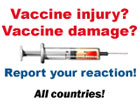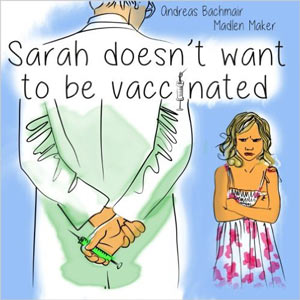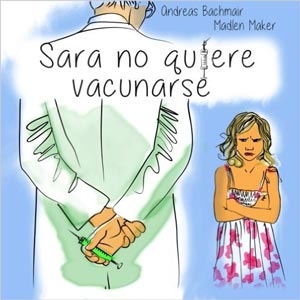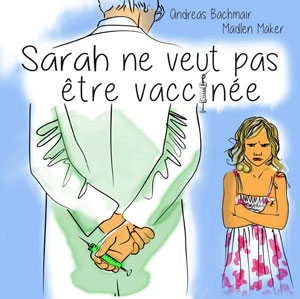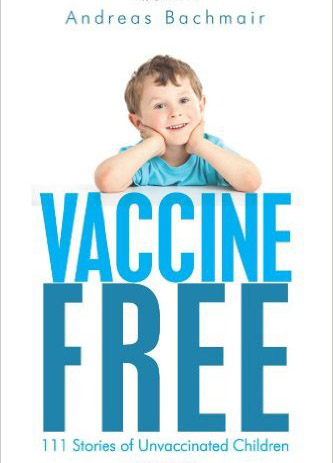Hepatitis B vaccination
Vaccine
The production of vaccine is genetically engineered today, because it is difficult to breed Hepatitis B viruses. Monkey and dog kidneys as well as human blood plasma of Hep. B positive people used to be used. For purposes of conservation aluminium hydroxide ,thimerosal or formaldehyde are added the 5 and 6 fold combination vaccines are free of thimerosal.
The vaccination is recommended for prematurely born babies even though it is known that they do not react well to vaccinations.
Immunity
no 100% vaccination protection. Up to 10% of adults do not develop sufficient antibody titers. The Center for Disease Control even speaks of 32% vaccination failures in adults after the third vaccination.(CDC: Morbidity and Mortality weekly report 1994,42(53): 10)
A trial conducted by MCQuillian did not see a drop in Hep. B diseases even six years after the vaccination had been introduced. (MCQuillan:HBV Prevalence is Unchanged by Hepatitis B Vaccine:http://www.hopkins-id.edu/stories_99.html#19)
Arzneitelegramm reported in March 1997 that according to the opinion of British epidemiologists 14 years after the introduction of the Hepatitis B vaccination a judgment as to the success or failure of targeted immunization was impossible.”
In a trial that was conducted in Switzerland Prof. Rolf Zinkernagel, a winner of the Nobel Prize and his coworkers determined that genetically engineered vaccines like the vaccine for Hepatitis B that gentechnical vaccines compared to standard vaccines create such an imbalance between the immune system and the virus that they have such a bad impact that the disease is worse rather than weakened after the disease breaks out. (OEHNEN et al, Science, 11.1.1991, 195-198).
The New England Journal of Medicine published a trial in which the people who had been vaccinated were more susceptible for the disease than those who had not been vaccinated.
There are also virus variants where vaccinations do not help.
Side effects, vaccination complications and vaccination damages caused by Hepatitis B vaccination in babies, children and adults
Hepatitis B vaccination bears a high risk of side effects. Auto-immune diseases are particularly problematic. Vaccine failures are in danger because their immune system does not react to the surface antigen of Hepatitis B.
Between July 1990 and October 1998 24775 cases of vaccination reactions after Hepatitis B vaccinations were reported. Of those 9673 were very serious and 439 children died. The VAERS reporting system (www.vaers.org) was established in 1990 and it is its task to collect reports of vaccination occurrences. Unfortunately only 10% of doctors report vaccination reactions to VAERS. The above mentioned numbers only represent one tenth of the real numbers..(HEPATITIS B VACCINE REACTION REPORTS OUTNUMBER REPORTED DISEASE CASES IN CHILDREN ACCORDING TO VACCINE SAFETY GROUP,NVIC January 27,1999)
The president of the American Association of Doctors and Surgeons said that children who are younger than 14 years of age have a three fold risk of dying after a hepatitis vaccination or an adverse effect than to contract the disease itself..(Fosters, 1999, COX News Service)
General reactions
More than every tenth person who has been vaccinated develops complications at the injection site such as reddening, swelling and pain. Fever, headaches, fatigue and joint pain is also relatively frequent.
Rheumatic diseases
Various types of arthritis occur relatively frequently after the Hepatitis B vaccination. Usually they are acute and they can also become chronic (U.Quast:Impfreaktionen Hippokrates Verlag)
Neurological diseases
Reactions such as Multiple Sklerose, Guillain-Barré-Syndrom and Enzephalitis are frequent (www.vaers.org; Stratton KR, Howe CJ, Johnston RB Jr. Adverse events associated with childhood vaccines other than pertussis and rubella. Summary of a report from the Institute of Medicine. JAMA. 1994 May 25;271(20):1602-5.)
As early as 1988 Shaw mentioned that the chance was 1: 20000 of neurological damage occurring after Hepatitis vaccination. If it is underreported only by a factor 5 the frequency would already be 1: 4000 (Shaw F., et al, Am J Epi 1988, 12:337-352).
After a trial had been conducted on the safety of Hepatitis B vaccinations on behalf of the Center of Disease Control and the National Institute of Health, the Institute of Medicine stated that Hepatitis B vaccinations cause demyelinizing neurological damages, mainly MS and GBS (Guillain Barrée Syndrome).
Multiple Sclerosis
There are indications that cases of multiple sclerosis after Hepatitis B vaccinations can be found in scientific literature. The connection has been refuted repeatedly and „proven by trials“.
Because of the suspicion of demyelinizing diseases Hepatitis B vaccinations were discontinued in France.
In 1998 Dr. Philippe Jacubowizc had collected more than 600 cases in which there were symptoms after a hepatitis B vaccination of which many resembled MS. As early as 1996 the French government had provided financial compensation for Hepatitis B vaccination victims. The intention had been to pay settlements to a large number of victims without going public. But the prerequisite for the compensation was that they waive their right to take the case to court and that they were not allowed to go public with their problem.
Even though the same vaccine is used in Germany, Austria and Switzerland as in France, there were no adverse events in the other countries. The authorities tried to assure the public that presently there were no scientific trials which would prove a connection between the vaccination and Multiple Sclerosis.
Both in England and Canada there were 100 cases of demyelinizing diseases. (Silvia Schattenfroh: Kein Zusammenhang zwischen Hepatitis-B- Impfstoffen und Multipler Sklerose, Berlin News9. September 1999).
The mechanism which explains why MS can occur after the Hepatitis B vaccination could be explained by the fact that the
vaccination contains Hepatitis B Polymerase Proteins which have a similar structure as the body’s own Myelin. This hepatitis B virus polymerase could then trigger an autoimmune demyelinization. (Multiple sclerosis and hepatitis B vaccination: Could minute contamination of the vaccine by partial Hepatitis B virus polymerase play a role through molecular mimicry? Faure E. Med Hypotheses 2005, May 19E.R. Biodiversity and Environment, case 5, University of Provence, Place Victor Hugo, 13331 Marseilles cedex 3, France)
Optic neuropathies (a potential symptom in MS) after hepatitis B vaccinations should be mentioned in this context. In a trial that included 27 children with acute optic neuropathies, the researchers around Hamard reported that this disease was frequently associated with hepatitis B vaccinations. Four of the 27 children who were examined later developed MS. (Hamard H, Hamard P, Gohier P, Roussat B, Doummar D, Iba-Zizen MT.["Idiopathic" acute optic neuropathies in children]Bull Acad Natl Med 2000;184(7):1511-9; discussion 1519-21 ).
In a control trial performed by Miguel it was determined that the risk people who had been vaccinated against Hepatitis B of contracting MS was 300% greater than those who had not been vaccinated. (Miguel A. Hernán, MD, DrPH, Susan S. Jick, DSc, Michael J. Olek, DO and Hershel JickRecombinant hepatitis B vaccine and the risk of multiple sclerosis, A prospective studyNEUROLOGY 2004;63:838-842)
Diabetes
There are also indications that there could be a connection to diabetes mellitus. Thus on his website (www.vaccines.net) Classen mentions an investigation performed by the Center for Disease Control in the US which stated that the risk of contracting insulin-dependent Diabetes was twice as high in the the second month after hepatitis B vaccinations. (The Center for Disease Control, CDC, Pharmacoepidemiology and Drug Safety Vol 6 Suppl. 2, S60; 1998).
In New Zealand the incidence of diabetes mellitus increased from 11.2 cases from 100000 to 18.2 cases after introduction of hepatitis rate. (Classen B, New Zealand Medical J Mai 1996)
You can find many vaccine side effects in our vaccine adverse reaction database.



